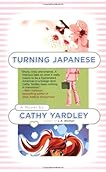 Turning Japanese by Cathy Yardley
Turning Japanese by Cathy YardleyMy rating: 2 of 5 stars
Chick lit goes to Japan in this frothy novel about a young woman who wins a one-year internship in Tokyo at a manga publishing company. Many things about this book bothered me...the main character, Lisa, enters and wins a contest to go to Tokyo for a year, but then doesn't want to go until her friends bully her into going. She is half Japanese and is supposedly near-fluent in Japanese, yet she's nearly completely clueless about the culture. (Although later in the book she speaks Japanese with her mom and it is noted that they hardly ever spoke it at home...so how did she become fluent?) She also doesn't seem to like Japanese food and acts as though it's horrible, although most half-Asian people I know grow up on Asian food.
I didn't like the sloppy writing: "God damn, I was tired." "I felt better, and worse. Sort of a hodge-podge of emotion, really." "It was a dull pain--like Jerry Maguire said, where you don't feel it now, but you get an inkling of what you're in for in the near future." (JERRY MAGUIRE???) Some of her writing effects, such as repeatedly calling her big suitcase "Godzilla Bag," annoyed me.
One evening when her homestay sister was holding hands with one of her female friends, Lisa comments "It wasn't that Yukari was gay, it was that weird little-girl thing. No one had tried for my hand yet, thankfully. I would've found that weird." In Asia and many other parts of the world, friends of the same gender often hold hands. It's normal. The way the author brought this into the story annoyed me.
Lisa has a hangover one morning, and she had not brought any medicine into Japan with her because "antihistamines were illegal in Japan" and "I did remember not wanting to get arrested for bringing over-the-counter stuff." You don't take antihistamines for a hangover, and this whole paragraph was just plain stupid. What kind of person travels to Japan for a year without taking American medicine?
Lisa is interviewed at a donburi restaurant, and she explains that donburi is meat served over rice in a bowl...but then talks about a press release saying "American simpleton contest winner gets to eat noodles." Rice is not noodles.
The day she arrived home from Japan, her mom offers to make some green tea for her, and she gets nostalgic for it, saying "I could still remember the smell." Of course she could--she had just left Japan!
Lisa supposedly cannot read Japanese very well when she first goes to Japan, and she claims she can just barely get by in speaking Japanese. Yet she is able to speak fluently with her colleagues and host family--even yell in Japanese. After spending 9 months there, she informs a prospective employer that she is fluent in written and spoken Japanese and can translate. This all does not compute.
Add to these problems the fact that Lisa's boyfriend is a narcissistic jerk and her friends are one-dimensional characters, and the fact that the author writes romance novels for Harlequin. Judging from her photo, she appears to be part-Japanese herself.
With all these flaws, you might be wondering why I finished the book. I am interested in most books set in Japan, after living there myself for 3 years and having met my husband there. This book made me think that I should write a novel about living in Japan myself--at least I would be determined to avoid all these inaccuracies! I kept reading just to see what would happen. Looking back now, though, my time could have been better spent...
View all my reviews
No comments:
Post a Comment